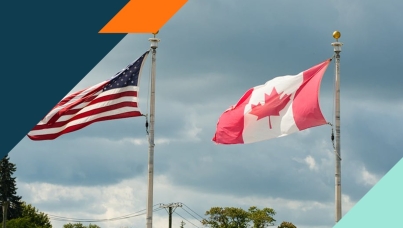Slim Majority (55%) of Canadians Support Modest Budget Deficit of $10B, But Support Drops Substantially for Higher Deficit
While yesterday's poll revealed that 53% of Canadians don't expect the Liberals to keep their election promises given economic conditions have changed, when it comes to the budget deficit, specifically, most want them to stay true to their word: three quarters (73%) `agree' (33% strongly/40% somewhat) that `the Liberals should not run a higher deficit than they promised during the Federal Election', while one quarter (27%) `disagrees' (5% strongly/22% somewhat). Quebecers (80%) are most likely to agree, followed by Canadians living in Saskatchewan and Manitoba (77%), Alberta (76%), Atlantic Canada (75%), Ontario (70%), and British Columbia (63%).
During the federal election campaign, Trudeau differentiated himself from other leaders by pledging to run a deficit of no more than $10B, but by December was already signalling that the deficit would likely be higher. The Liberals have since suggested it could top $20B, and some experts predict that the deficit could be as much as $30B or more.
A slim majority (55%) of Canadians `support' (9% strongly/46% somewhat) the government proposing a budget that runs a $10B deficit, while a minority (45%) `opposes' (18% strongly/27% somewhat) a $10B deficit. Support for a $10B deficit is not even across Canada, with those in BC (63%) and Saskatchewan and Manitoba (59%) being most supportive, followed by those in Ontario (56%), Alberta (55%) and Atlantic Canada (54%). Only a minority (47%) of Quebecers supports a deficit of $10B. Support for larger deficits drops substantially:
- Just one quarter (26%) `supports' (4% strongly/22% somewhat) a deficit of $20B, while three quarters (74%) `oppose' (39% strongly/35% somewhat) it.
- Only 15% `support' (3% strongly/12% somewhat) a deficit of $30B, while most (85%) `oppose' (56% strongly/28% somewhat) it.
- Few (12%) `support' (3% strongly/9% somewhat) a deficit of $40B, while nine in ten (88%) `oppose' (64% strongly/24% somewhat) a deficit of this magnitude.
It's important to note that most (74%) Canadians would `support' (39% strongly/35% somewhat) a balanced budget that runs no deficit, while one quarter (26%) `opposes' (7% strongly/19% somewhat) running a balanced federal budget. Depending on the size of the deficit, Justin Trudeau risks being offside with Canadians without a solid explanation as to why it is necessary.
While economic conditions have changed since the election, six in ten (63%) Canadians suggest that the Liberal pledge to keep the deficit to $10B was simply an election manoeuvre `agreeing' (29% strongly/34% somewhat) that `the Liberals knew that they couldn't keep the budget deficit to $10B during the election, but they said it any just to get elected'. Four in ten (37%) `disagree' (7% strongly/30% somewhat) with this position . Residents of Saskatchewan and Manitoba (74%) are most inclined to agree, followed by those in Quebec (70%), Alberta (68%), Ontario (60%), BC (55%) and Atlantic Canada (55%).
Canadians appear more supportive of deficits than the alternative of raising taxes. Just two in ten (21%) `agree' (5% strongly/16% somewhat) that they'd `rather the government raise taxes on people like me than run a larger budget deficit', while most (79%) `disagree' (36% strongly/43% somewhat) that they'd rather be taxed.
The Trudeau government has argued that major infrastructure investments are needed to jump-start the economy, and that deficits are required to finance these investments. While nearly six in ten (56%) Canadians `agree' (11% strongly/45% somewhat) that `stimulating the economy through deficits and infrastructure spending is the right thing to do right now', four in ten (44%) `disagree' (10% strongly/33% somewhat) that it is. Residents of BC (72%) agree most, followed by those in Saskatchewan and Manitoba (65%), Atlantic Canada (64%), Ontario (54%), Alberta (53%) and Quebec (49%). But as noted above, the size of the deficit also matters.
As an alternative approach to stimulating the economy, two in three (67%) Canadians `agree' (24% strongly/43% somewhat) that `reducing taxes to give more money to Canadian families would do a better job stimulating the economy than spending on infrastructure projects'. One in three (33%) `disagrees' (6% strongly/26% somewhat) that tax cuts would be a more effective stimulus measure than infrastructure spending. On tax cuts, Atlantic Canadians (78%), residents of Saskatchewan and Manitoba (77%) and Quebec (76%) are most likely to agree they'd be more effective than deficit-driven stimulus, while those in Ontario (63%), Alberta (61%) and BC (60%) are substantially less likely to agree - although still a majority.
These are some of the findings of an Ipsos poll conducted between March 14 and 16, 2016, on behalf of Global News. For this survey, a sample of 1,008 Canadians from Ipsos' online panel was interviewed online. Weighting was then employed to balance demographics to ensure that the sample's composition reflects that of the adult population according to Census data and to provide results intended to approximate the sample universe. The precision of Ipsos online polls is measured using a credibility interval. In this case, the poll is accurate to within +/ - 3.5 percentage points, 19 times out of 20, had all Canadian adults been polled. The credibility interval will be wider among subsets of the population. All sample surveys and polls may be subject to other sources of error, including, but not limited to coverage error, and measurement error.
For more information on this news release, please contact:
Darrell Bricker
Global CEO
Ipsos Public Affairs
416.324.2001
[email protected]
About Ipsos in Canada
Ipsos is Canada's market intelligence leader, the country's leading provider of public opinion research, and research partner for loyalty and forecasting and modelling insights. With operations in eight cities, Ipsos employs more than 600 research professionals and support staff in Canada. The company has the biggest network of telephone call centres in the country, as well as the largest pre-recruited household and online panels. Ipsos' marketing research and public affairs practices offer the premier suite of research vehicles in Canada, all of which provide clients with actionable and relevant information. Staffed with seasoned research consultants with extensive industry-specific backgrounds, Ipsos offers syndicated information or custom solutions across key sectors of the Canadian economy, including consumer packaged goods, financial services, automotive, retail, and technology & telecommunications. Ipsos is an Ipsos company, a leading global survey-based market research group.
To learn more, please visit ipsos.ca.
About Ipsos
Ipsos is an independent market research company controlled and managed by research professionals. Founded in France in 1975, Ipsos has grown into a worldwide research group with a strong presence in all key markets. Ipsos ranks third in the global research industry.
With offices in 86 countries, Ipsos delivers insightful expertise across six research specializations: advertising, customer loyalty, marketing, media, public affairs research, and survey management.
Ipsos researchers assess market potential and interpret market trends. They develop and build brands. They help clients build long-term relationships with their customers. They test advertising and study audience responses to various media and they measure public opinion around the globe.
Ipsos has been listed on the Paris Stock Exchange since 1999 and generated global revenues of e1,669.5 ($2,218.4 million) in 2014.
Visit ipsos.com to learn more about Ipsos' offerings and capabilities.



